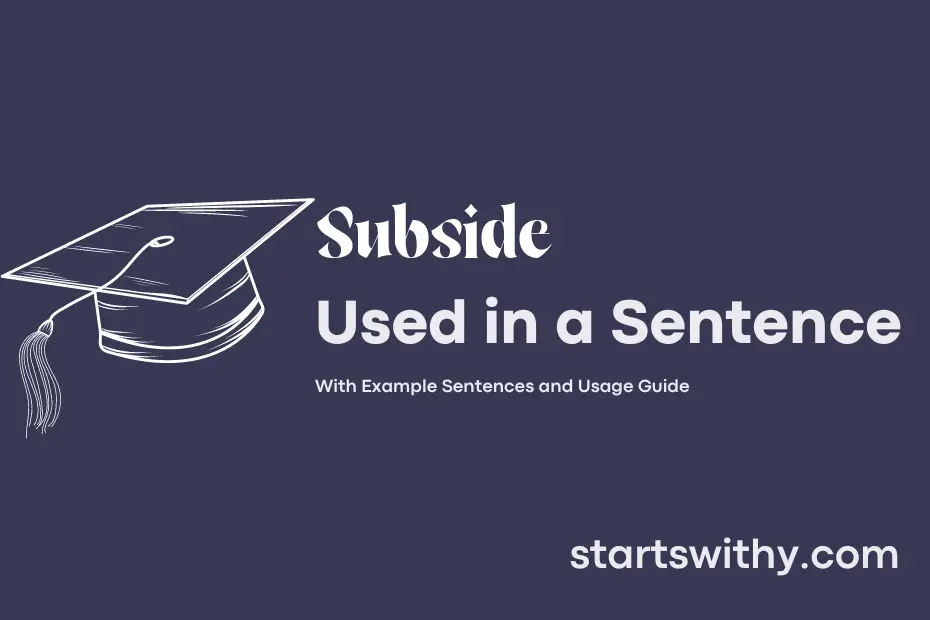Have you ever experienced a situation where intense emotions or physical sensations gradually decreased or lessened? This process of diminishing or calming down is known as “subsiding.” When something subsides, it typically fades away or becomes less intense over time, bringing a sense of relief or resolution.
In everyday life, we can observe the concept of subsiding in various contexts, from emotions like anger or anxiety gradually easing off, to physical symptoms such as pain or swelling diminishing. Understanding how things subside can help us navigate challenges and appreciate the transient nature of experiences.
7 Examples Of Subside Used In a Sentence For Kids
- After the rain, the water will subside.
- If you drink water, your thirst will subside.
- When you rest, your pain will subside.
- When you take deep breaths, your anxiety will subside.
- If you eat slowly, your hunger will subside.
- After playing, your tiredness will subside.
- If you count to ten, your anger will subside.
14 Sentences with Subside Examples
- After a vigorous workout, the soreness in my muscles began to subside.
- As the exam season approached, the stress levels of the students did not subside.
- The party next door was so loud that it took hours for the noise to finally subside.
- The line at the campus cafeteria started to subside as lunchtime passed.
- The excitement of the college festival only began to subside after days of energetic celebrations.
- The tension between roommates finally started to subside after a heartfelt conversation.
- The arguments during the student council meeting would not subside until a compromise was reached.
- The flu outbreak on campus took weeks to subside, causing many students to fall ill.
- The chaos in the dormitory common room only began to subside when the RA intervened.
- The temporary ban on outdoor activities due to pollution levels did not subside for several days.
- The anticipation for the upcoming sports tournament would not subside among the college athletes.
- The confusion about the assignment guidelines would not subside until the professor clarified them.
- The excitement over the annual college fest started to subside only after the event concluded.
- The crowd at the college library would gradually subside as the night grew later.
How To Use Subside in Sentences?
Subside means to become less intense, severe, or active after reaching a peak. It is often used in the context of emotions, symptoms, or natural phenomena.
Here are some examples of how to use subside in a sentence:
- After the storm, the winds began to subside and the sun finally peeked through the clouds.
- She took deep breaths to help her anger subside before responding to the provocation.
- The pain in his knee gradually started to subside after applying an ice pack.
- The excitement in the room slowly began to subside as the speaker finished their presentation.
- It may take a few days for the swelling to subside after injuring your ankle.
When using the word subside, remember to consider the context in which it is being used. Subside is often followed by words like “pain,” “anger,” “storm,” or “symptoms” to indicate what is becoming less intense or severe.
By incorporating subside into your vocabulary and sentences, you can effectively communicate changes in intensity or activity over time. Remember to practice using subside in various contexts to become more comfortable with its usage.
Conclusion
In conclusion, the examples of sentences with “subside” illustrate its meaning of something gradually diminishing or becoming less intense. Through these sentences, we see how various situations, such as pain, weather, or emotions, can subside over time. This word conveys the idea of a decrease or easing of a particular condition, highlighting the transient nature of many experiences we encounter in life.
Understanding the concept of subsiding is not only about recognizing when something is diminishing but also acknowledging the relief or calm that often follows. By observing how different contexts use this word, we can appreciate the natural fluctuations and temporary nature of many aspects of life, be it physical discomfort, natural phenomena, or even strong emotions.



